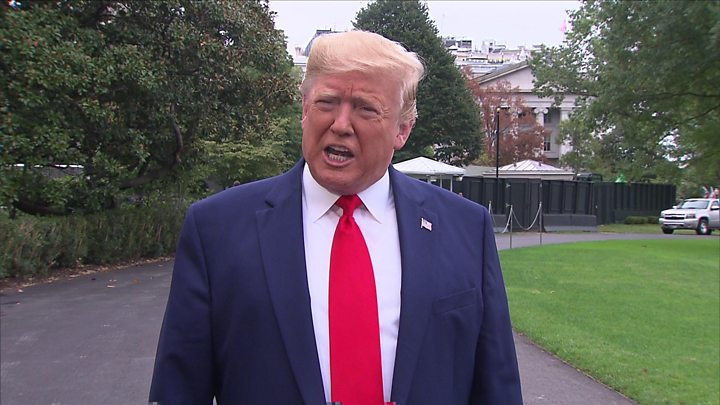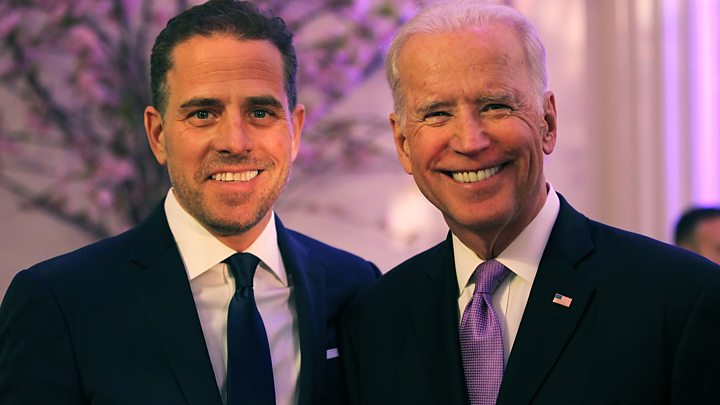How damaging are Ukraine texts for Trump?
Kurt Volker brought receipts, as the saying goes – and it could spell real trouble for President Donald Trump.
During the former US special envoy to Ukraine’s private testimony to congressional committees on Thursday, he turned over a trove of text messages and other communications.
They documented the Trump administration’s efforts to get the Ukrainian government to investigate a Ukrainian company with ties to Joe Biden’s son and conspiracy theories around Russian hacking during the 2016 US presidential election.
On Thursday night, Democrats in the US House of Representatives – which is conducting an impeachment investigation of Donald Trump – made public a selection of these messages.
While some Republicans are saying the release does not paint a complete picture of the Trump administration’s diplomatic efforts and the motivations behind them, the messages themselves offer dramatic evidence of what Democrats view as an abuse of presidential authority.
Donald Trump and his defenders have insisted there was no quid-pro-quo in his dealings with Ukrainian President Volodymyr Zelensky. The text messages, however, tell a different story.
It was very clear to members of the administration’s Ukrainian diplomatic team what Mr Trump wanted – a publicly announced Ukrainian investigation of political rival Joe Biden and the 2016 election hacking, which the intelligence community has concluded was carried out by Russia (although Mr Trump still has his doubts).
Who are the US envoys?
Messages appear to show the US diplomats coordinating Ukraine’s investigation announcement, saying that a draft of Mr Zelensky’s statement should include references to 2016 and Burisma, the company that Mr Biden’s son worked for.
It also was very clear what they had to offer the Ukrainians: not only US military aid, which had been put on hold by the White House, but also a meeting between the two presidents in Washington that would have be extremely valuable in bolstering the legitimacy of the newly elected Ukrainian leader.
Drawing a straight line between the offer and the ask doesn’t take much imagination – and at least one US diplomat, acting US Ambassador to Ukraine Bill Taylor, had serious concerns about the propriety of it all.
He worried that delaying congressionally authorised US military aid to Ukraine, as the Trump administration had done in July, would be a boon to Russia – and would put Ukraine in a precarious spot. He wondered whether the aid, and a potential Zelensky visit to Washington, were being explicitly conditioned on Ukrainian “investigations”.
“I think it’s crazy to withhold security assistance for help with a political campaign,” Mr Taylor texted Gordon Sondland, the deep-pocketed Republican donor who Mr Trump nominated to be US ambassador to the European Union.
After five hours, Mr Sondland – whose previous messages to Mr Taylor were conversational – replied with a denial of any “quid pro quo” that sounded like a statement crafted by lawyers, followed by a request that they stop texting about it.
Other text messages – between Mr Taylor, Mr Sondland and Mr Volker are even more direct. The team seemed intent on getting the Ukrainians to release a statement announcing a new corruption investigation into Burisma and possible Ukrainian involvement in the 2016 hacking – a move that, even if it amounted to nothing, could have provided political ammunition for Republicans to undermine Mr Biden’s presidential campaign.
“Heard from the White House – assuming President Z convinces Trump he will investigate / ‘get to the bottom of what happened’ in 2016, we will nail down date for visit to Washington,” Mr Volker wrote, in which seems the clearest acknowledgement of a quid pro quo.
It may not be long before the White House falls back to its final line of defence – that threatening and cajoling Ukraine to investigate Mr Biden and the 2016 hacking was a reasonable exercise of a president intent on cracking down on corruption involving a then high-ranking American official.
“We are looking at corruption, we are not looking at politics,” Mr Trump said on Friday morning. “I don’t care if it’s Biden or anybody else.”
He may say he doesn’t care if it involves Biden (and he dodged a question about whether he’s ever asked foreign leaders for an investigation of someone who is not a political rival), but this strategy will necessitate all-out attacks on Mr Biden, his son Hunter and their reputation – despite no current evidence that the then-vice-president acted inappropriately in his interactions with Ukrainian officials.
In the past two days, Mr Trump has said the Bidens are “crooked”, that they are “pillaging the country” and that the former vice-president arranged “sweetheart deals” with foreign governments in order to help his son.
Complicating matters for the White House, however, was Mr Trump’s decision on Thursday to suggest both Ukraine and China open investigations into the Bidens – essentially saying publicly what Democrats were accusing him of doing in his private phone call with Mr Zelensky.
That he made the suggestion to China less than a minute after discussing the two nations’ ongoing trade negotiations and saying that the US has “tremendous power” will leave Democrats howling – particularly after a report later in the day that Mr Trump brought up Mr Biden in a 18 June call with Chinese President Xi Jinping.
Not to be outdone, Rudy Giuliani, the former New York mayor who has essentially served as the president’s private detective investigating the Bidens, told the Wall Street Journal that Mr Trump ordered the dismissal of the previous US ambassador to Ukraine, Marie Yovanovitch, because she was insufficiently supportive of the Biden investigation.
All in all, the recent spate of revelations paints a picture of a White House wielding the tools of foreign policy to advance goals that could be seen as overtly political. Many Democrats have already said this is an abuse of power necessitating presidential impeachment and removal from office.
A handful of Republicans have also been critical. In a series of tweets on Friday, Mitt Romney – the 2012 Republican presidential nominee – offered a stinging rebuke of the president.
“When the only American citizen President Trump singles out for China’s investigation is his political opponent in the midst of the Democratic nomination process, it strains credulity to suggest that it is anything other than politically motivated,” he wrote. “By all appearances, the president’s brazen and unprecedented appeal to China and to Ukraine to investigate Joe Biden is wrong and appalling.”
The reality, however, is that for all the blows Mr Trump has received and may yet endure, none of them may prove fatal. He’s faced seemingly mortal crises before, only to plough through and emerge intact on the other side.
Impeachment, even if it now seems like a foregone conclusion, isn’t the end of the Trump presidency. That would take two-thirds of the Republican-controlled Senate voting for removal.
As Axios’s Mike Allen points out, the chamber has more than enough Republican senators from states where the president remains popular – 36 – to form a “red firewall” to block removal. Unless Mr Trump’s approval craters, any of these senators voting to convict the president would be tantamount to political suicide.
The president knows how to endure the “political storm”, as he called it earlier this week. “I’m used to it,” he said. “For me, it’s like putting on a suit in the morning.”
With what’s coming in the days ahead, he’s going to need that to be a suit of armour.
Follow Anthony on Twitter
Source: Read Full Article





